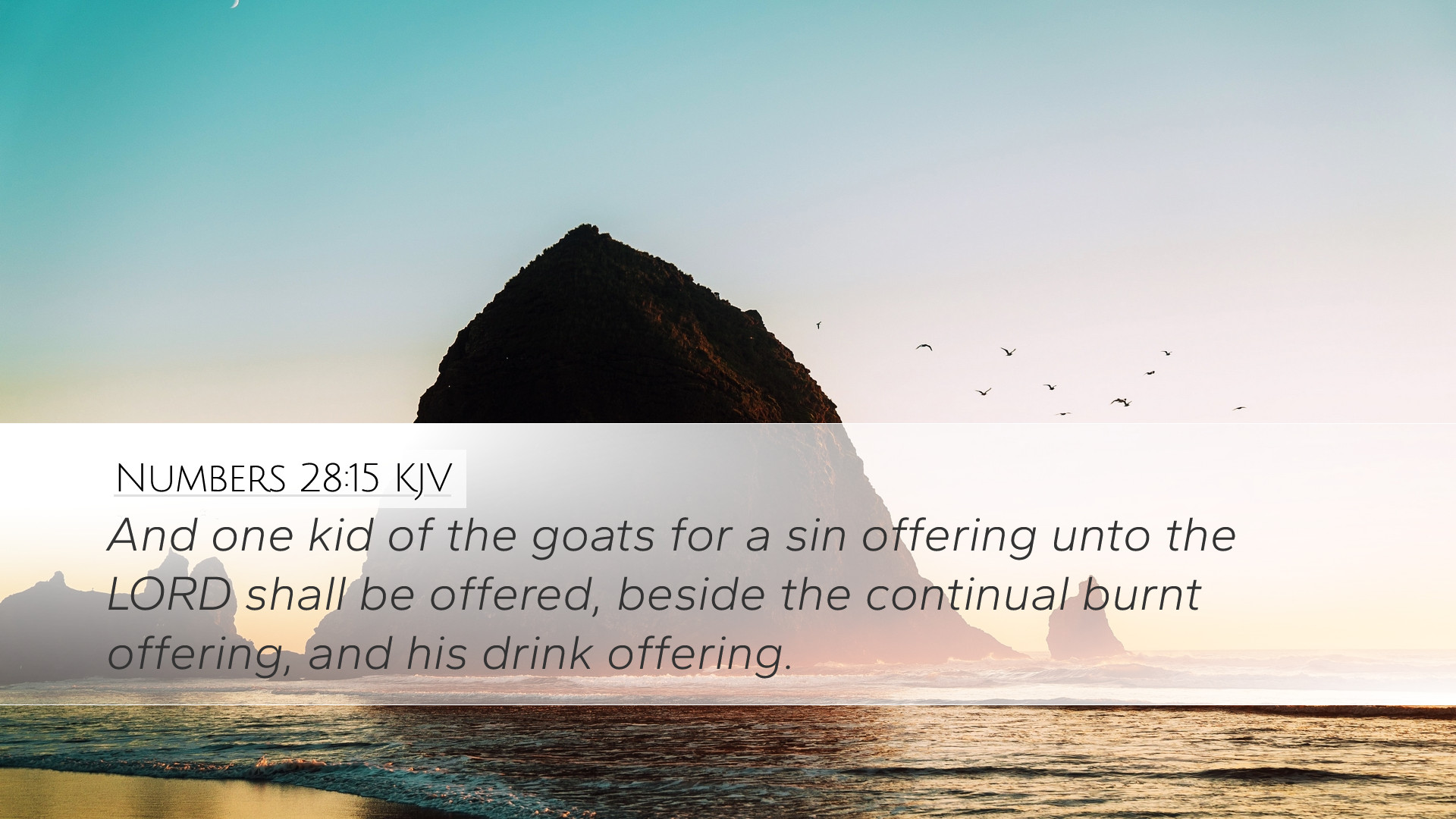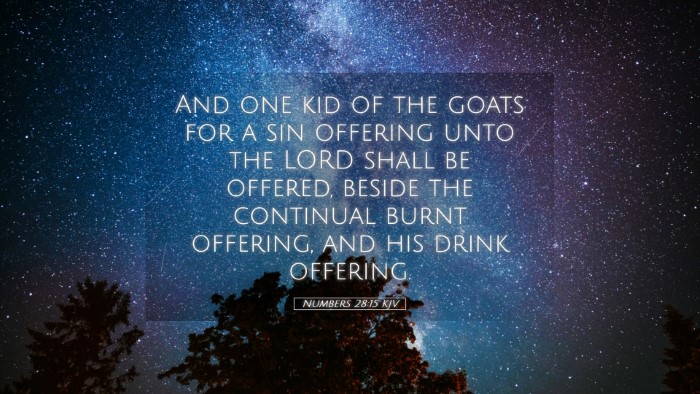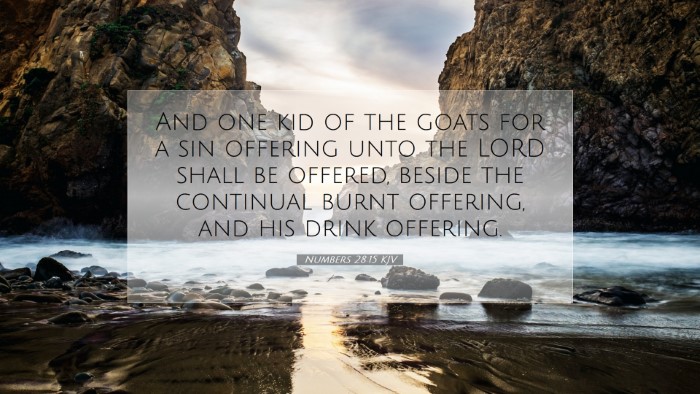Bible Commentary on Numbers 28:15
Numbers 28:15 states, "And one kid of the goats for a sin offering unto the Lord shall be offered, beside the continual burnt offering, and his drink offering." This verse is part of the instructions regarding offerings that were to be made regularly by the Israelites as part of their covenant with God. In this commentary, we draw insights from established commentaries to provide a comprehensive understanding of this passage.
Contextual Analysis
The book of Numbers provides a historical and theological framework for understanding the rituals and offerings prescribed to the Israelites. In chapter 28, the Lord outlines the daily, weekly, and monthly offerings, emphasizing the importance of maintaining a constant relationship with Him through these sacrifices. The inclusion of specific offerings, such as the sin offering mentioned in Numbers 28:15, indicates a recognition of human imperfection and the perpetual need for atonement.
The Significance of the Offerings
In examining the significance of the offerings detailed in Numbers 28, we find the following key insights:
- Continual Atonement: As noted by Matthew Henry, the sin offering serves to atone for the sins of the people. It is a reminder of the necessity of reconciliation with God, underscoring the importance of acknowledging sin in the life of the community.
- Assurance of God's Grace: Albert Barnes emphasizes that the regularity of the offerings signifies God's ongoing mercy. Each offering reaffirms God's willingness to forgive and maintain His covenant with Israel.
- Community Responsibility: Adam Clarke points out that the phrasing of the commandments signifies that these offerings were not just individual but corporate acts of worship. They reflect the community's united response to God's holiness and justice.
- Symbol of Christ: The interpretations of the verse have often been viewed through the lens of Christian theology, where the sacrificial system prefigures the ultimate sacrifice of Christ. The sin offering foreshadows the intercession of Jesus as the perfect sacrifice for humanity's sins.
Detailed Breakdown of the Verse
Let us delve deeper into the elements of this verse:
- "One kid of the goats": This particular choice of animal indicates a standard form for sin offerings, which were typically a young goat. This reflects the communal standards of sacrifice, where the offering wasan accepted form before the Lord.
- "For a sin offering": The sin offering emphasizes the purification aspect. It serves a purpose of cleansing and allows for the community to stand right before God.
- "Unto the Lord": The act of offering is fundamentally directed towards God. This shows that worship and sacrifice were meant to demonstrate reverence and obedience to the Creator.
- "Shall be offered, beside the continual burnt offering": The burnt offering symbolizes total dedication to God. The inclusion of the sin offering alongside it underlines the comprehensive nature of worship—acknowledging one’s sinfulness while also dedicating oneself wholly to God.
- "And his drink offering": The additional mention of a drink offering further demonstrates the depth of worship in the Old Testament. The drink offering typically accompanied the burnt offering, symbolizing the full surrender to God and the desire for His presence and blessing.
Theological Implications
This verse holds significant theological implications, particularly in relation to the following themes:
- Holiness of God: The requirement for sin offerings serves as a stark reminder of God's holiness and the need for atonement when approaching Him. The ritual acts are rooted in the recognition that God is set apart and that sin creates a divide between humanity and the divine.
- Nature of Sin: The emphasis on sacrifices for sin illustrates a biblical understanding of sin as an integral aspect of the human condition. Recognizing and addressing this through offerings becomes a vital part of the Israelite faith.
- Community vs. Individual: The observance of these offerings points to the collective responsibility of the Israelite community to uphold the covenant relationship with God. It emphasizes corporate worship and accountability within the faith community.
- Covenantal Relationship: The offerings reaffirm the covenant bond between God and His people. They are not only acts of worship but reminders of God's promises and the ongoing nature of His grace.
Practical Applications
From the insights gleaned from the verse and the commentaries, we can glean several practical applications for today’s believers:
- The importance of confession: Just as the Israelites were called to offer sacrifices, Christians today are reminded of the need for regular confession and acknowledgment of sin in their lives, maintaining that relationship with God.
- Worship as a lifestyle: The continual nature of the offerings speaks to the call for believers to live lives of worship, recognizing God’s sovereignty and grace in all aspects of life.
- Community in faith: The sin offering reflects the necessity of corporate responsibility in faith communities. Believers should strive to support one another in spiritual growth and accountability.
- Christ as the ultimate sacrifice: The study of offerings in the Old Testament helps believers to appreciate the significance of Christ's sacrifice and encourages a deeper understanding of the nature of redemption.
Conclusion
Numbers 28:15 encapsulates essential elements of the Israelite sacrificial system, serving as a profound reminder of the need for atonement and the ongoing relationship between God and His people. Through a study of this verse, believers are encouraged to reflect on their own walk with God, understand the depth of their worship, and recognize the importance of community in the faith journey. The insights provided by esteemed commentators provide a well-rounded understanding that is relevant not only for pastors and theologians but for all who seek to live faithfully before the Lord.


